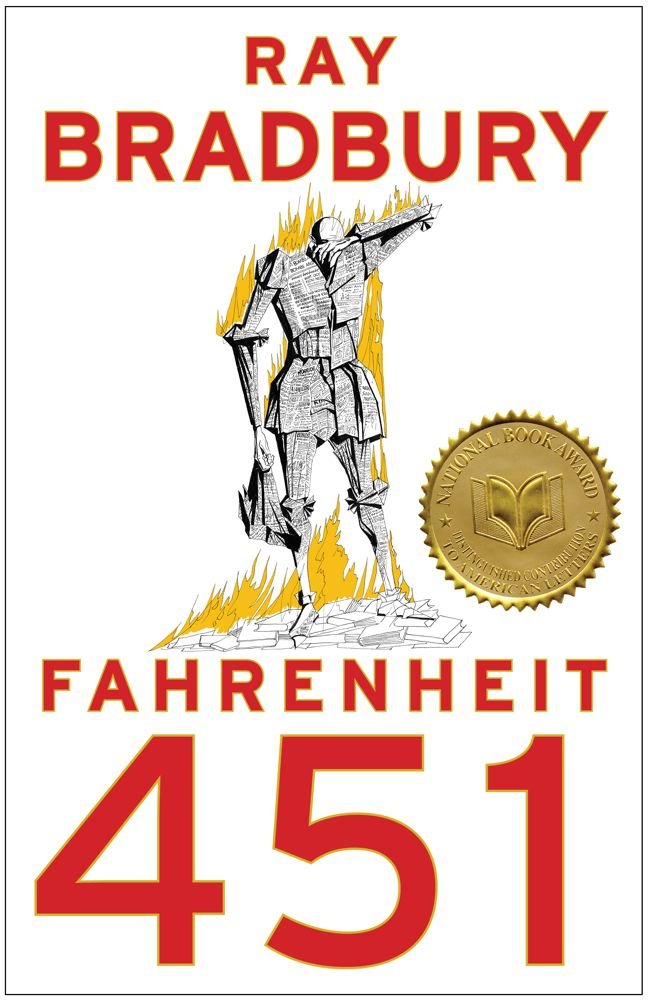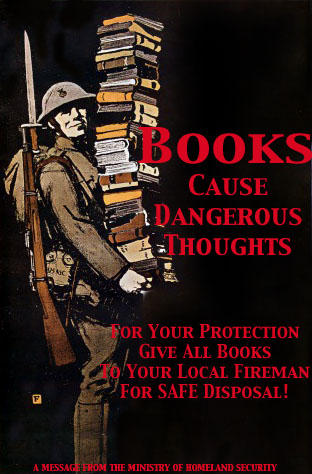Activity “Fahrenheit
451”, The Sieve and the Sand
Read,
identify & write a comment on five of the following literary devices
(metaphor, simile, alliteration, irony, sarcasm, understatement, paradox,
oxymoron) on the second part of the novel “Fahrenheit 451” The Sieve and the
Sand. Make sure you perform a detailed analysis on the effect that the literary
devices have on the reader and an explicit explanation of why you perceive
that. Annotate and cite the necessary quotes as well as the corresponding pages.
Metaphor: According to the Cambridge Dictionaries
Online, metaphor stands for “a form of expression (not using ’like’ or ’as’) in which
a quality or characteristic is given to a person or thing by using a name, image, adjective etc normally used of something else which has similar qualities etc”. An example of
this is the title of the chapter “the Sieve and the Sand” (pg. 67) because it
represents really the desire of Montag to maintain himself and the wisdom of
the books inside his head before it fades away. This makes us think that maybe
we rush things in life because we hold on to things really hard and we just
dislike change. This makes us feel interested in a life that is breaking apart
at every second and we don’t have the chance to catch on to that sieve. Its
like we are doomed to be stop being remembered and that the people who wrote
those amazing books are going to be forgotten as well as their books and all
humanity is going to fall apart.
Alliteration: According to the Cambridge Dictionaries
Online, alliteration stands for “the use of the same sound at the beginning of a series of words in order to achieve a particular effect”. An example of this “The people who had
be sitting a moment before, taping their feet to the rhythm of Denham’s
Dentifrice, Denham’s Dandy Dental Detergent, Denham’s Dentrifice Dentrifice
Dentrifice, one two, one two three, one two, one two three.” (pg. 75) because
it replicates de word Denham’s and also uses other words that start with D. The
idea of singing a song like this makes it like a tongue twister. Also, it makes
us wonder how did they learnt it, it’s like they have a lot of free time and
spend a lot of time in meaningless things like that. This makes us feel
confused and repetitive because in that society they bombed the people with
information and made them think about them with the sound. It makes us feel
interested in that brand and that’s not right because it meant that they
achieved their purpose so we feel in some way weak. It seems like a catchy song
transports a lot of information we didn’t know about and that makes us feel
insecure about what we hear everyday and what mass media is telling us to do
without us noticing.
Allegory: According to the Cambridge Dictionaries
Online, allegory stands for “a story, play, poem, picture, or other work in which the characters
and events represent particular moral, religious, or political qualities or ideas”. An example of this is “‘Fill this sieve
and you get a dime!’ And the faster he poured, the faster it sifted through
with a hot whispering. His hands were tired, the sand was boiling, the sieve
was empty.” (pg. 74) because it represents the desperation to catch some sort
thought but he couldn’t. It represents the actual society in which he lives and
how hard is it to catch the most simple and small things because they didn’t
actually learnt to think. To catch sand with a sieve is almost impossible but
the sensation of filling something feels real for some time. It’s now when they
realize that the things they actual thought about was really nothing and what
they thought they knew, it’s fading away. This makes us feel in some way lucky
because we got the sensation that we know ourselves and we know what we are
doing. This causes some kind of stress with the fact that you can’t catch
anything but makes us calm because we do, we know how to think and we know
about our past.
Analogy: According to the Cambridge Dictionaries
Online, analogy stands for “a comparison of the features or qualities of two different things to
show their similarities”. An example of this is
“The salamander devours his tail!” (pg. 82) because Montag does a comparison
between a salamander killing itself and firemen that have books, burning their
own houses because they couldn’t have the books for more that 24 hours. This
makes us feel like the analogy try to guide us through the story and that the
author is trying to do connections with the objective, the purpose, the actions
and the methods. It also makes us think about how ridiculous is to burn the
only source of actual intellect that is left and it’s as ridiculous as an
animal eating itself. It makes us fell like it hurts to leave behind something
important like a part of you that you keep on loosing because you don’t have
the ability to recover your thoughts. It makes us feel frustrated and bad for
the characters of the book and the ones on the society.
Irony: According to the Cambridge Dictionaries
Online, irony stands for “a form of deliberate mockery in which one says the opposite of what is obviously true”. An example of this is
“The salamander devours his tail!” (pg. 82) because it’s a mockery about how
living and knowing are so important but the firemen and the salamander keep on
taking them away. It’s obvious that someone wants to keep their identity, their
thoughts, they want to be free of thinking but it’s totally ironic that they
smash the only opportunity they have to do it. That makes us think that humans
can be really confused sometimes because we don’t really understand our
priorities or we ignore them. It made as reflex about when and how we made
something really dumb without realizing it and how the desire for knowing and
for understanding leads to better choices.
Bibliography
Bradbury, R. (1950). Fahrenheit
451. (T. S. Bureau, Ed.) New York, United States: Simon & Schuster.
Cambridge University Press. (1999). American
english. (U. o. Cambridge, Editor, & Syndicate of the University of
Cambridge) Retreived the 30 of 2015, from Cambridge Dictionaries online:
http://dictionary.cambridge.org/us/dictionary/american-english/






No hay comentarios.:
Publicar un comentario